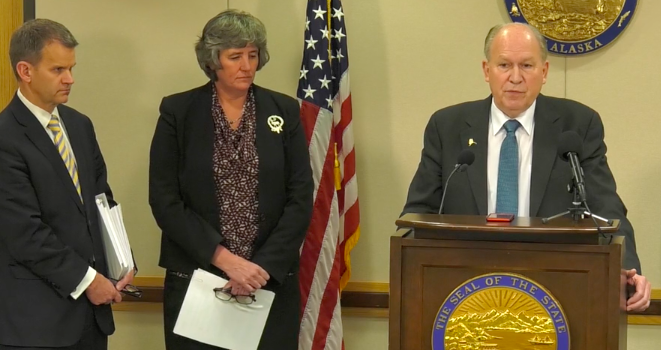GOVERNOR GOES FOR CONSOLIDATION OF POWER
Rolling out his third budget on Friday, one of his largest yet, Gov. Bill Walker declared the budget process broken.
“There’s no question the process is broken,” he said, with emphasis. “It’s a terrible way to run a state.”
He might be right.
Walker has tried to force taxes on working Alaskans, has called the Legislature into nine special sessions, and yet has made no meaningful budget adjustments to day-to-day operations.
He let public safety lapse and chased off the oil industry, while focusing on his one obsession: A gasline.
Some Alaskans would agree that’s a terrible way to run a state.
Any budget process can be improved, but Alaska is a state that has depended on oil royalties for state programs since the 1980s, and other governors have coped with low oil prices — sometimes as low as $7 a barrel.
The revenue stream is getting healthier in 2018. The state is forecasting $250 million more revenue for 2018. Although Walker’s administration didn’t announce it, the state’s credit rating with Moody’s went from negative to stable a few weeks ago.
But the way Walker explains it, it’s the Legislature’s fault that the struggle over his budget has gone all the way to the last possible day, with state shutdowns threatened, before he had something to sign.
It was an admission of sorts that he himself broke the process by insisting year after year on various income taxes, oil taxes, fish taxes, mining taxes, and motor fuel taxes, all of which are woefully inadequate to close the budget gap.
And he didn’t acknowledge his own role and that of his surrogates in creating the House Democrat-run majority, which was his strategy for getting taxes passed. Instead, the “budget process is broken.”
Walker has proposed many taxes, all with different revenue amounts, year after year. He just hasn’t been able to convince either Republicans or Democrats that his plan is good for Alaska during the worst recession since the 1980s.
Walker’s remedy is proposing to consolidate even more power in the Office of the Governor. He’s using a stick this time.
The fix he says, is if he doesn’t provide a proposed budget by Dec. 15th, then his pay gets docked. And if the Legislature doesn’t get a budget done in 90 days, their pay and per diem gets docked. It sounds so simple.
It is, however, likely unconstitutional.
It’s also a nonstarter. The governor is an executive with a staff. A very large staff. He is supposed to offer a balanced budget. The legislative body represents 60 districts around the state, and is the appropriator. The Legislature is not designed to simply rubber stamp the governor.
WALKER LOVE AFFAIR WITH JOB TAX CONTINUES
To review where Walker has been in his tax journey:
Oct. 14, 2014: “I have no intention to implement a statewide tax or paying for state government by reducing Permanent Fund dividend checks. If we properly develop our natural resources and put in place a sustainable budget that should not be necessary.”
2015: Walker inherited the Parnell budget and didn’t like it. But his team was not yet in place. He advanced the budget in December, 2014, but without endorsing it. Commissioner of Revenue Randall Hoffbeck was still in Africa, and the new administration scrambled to get its arms around budgeting. Walker declared a $3.5 billion gap between revenues and spending. He ended up signing a general fund budget of $4.95 billion (unrestricted funds basis).
2016: The governor announced the New Sustainable Alaska Plan, and said that he could not cut any more, and that there are “14 hundred fewer state employees than a year ago.” The gap was now $3.8 billion, he said. He said the budget had been cut by 44 percent. He vetoed half of Alaskans’ Permanent Fund dividends.
In this video, Walker said oil revenue could no longer sustain us without taxes, and warned there will be no more Permanent Fund dividend checks by 2020.
2016: The governor addressed Alaskans in April, 2016. Now, he said, the deficit was $4 billion a year.
Without an income tax, the Permanent Fund dividend would go to zero in less than four years, all the state savings accounts would be drained, the state’s bond rating would continue to drop, and investors would lose confidence in Alaska. Walker did not explain how the limited revenue that would be raised by an income tax would prevent all of those things.
“We cut more than a billion dollars from state spending since I took office. In fact, overall spending has fallen from $8 billion in 2013 to about $4.7 billion for 2017. That’s a drop of 40 percent in four years,” he said.
“I’m proposing a modest income tax pegged to the federal income tax. State income taxes are deductible from federal taxes. This brings tax dollars paid to the federal government by Alaskan taxpayers back to Alaska,” he said.
2017: Walker asked for a tax once again, and called the Legislature back into special session four times without luck. The Senate was having none of it. Walker also submitted a budget of $4.2 billion, but signed an expanded budget of $4.9 billion.
2018: Walker has a new plan, the “Alaska Economic Recovery Plan,” again asking for a tax on jobs, and using that money to employ unions to fix deferred maintenance.
His proposed budget is $4.7 billion, a half a billion higher than what he proposed at this time last year and close to what he signed as the final budget for FY18.
THE UNIONS GOT THEIR DEAL
Walker reminded reporters on Friday that the state has the highest unemployment in the nation. “And we need to put Alaskans back to work.” By imposing taxes on them?
Although Walker had the chance to put thousands of Alaskans to work (with the federally funded Juneau Access project he nixed), his new plan is to take part of working class Alaskans’ paychecks and create union jobs to work on government deferred maintenance projects.
Unions were mad about the cancellation of the only shovel-ready project in Alaska, Juneau Access.
It was expected that for them to support the governor once again, the unions would need something — anything — before the 2018 elections.
Last week, union leaders signed on to Walker’s campaign; AFL-CIO President Vince Beltrami and Laborers President Joey Merrick both allowed their names to be used on a Walker fundraising invitation.
The deal was done. In exchange for their support of his candidacy, 1.5 percent of every Alaska worker’s paycheck would be redirected to programs that employ AFL-CIO members.
Unions will swarm Juneau this winter fighting for this tax. And they’ll be putting a lot of money into campaigns to oppose any political leader who opposes the income tax.
DEMOCRATS RESPOND
Senate Minority Leader Berta Gardner approved of the tax plan, but didn’t like paying the tax credits owed to small oil and gas companies:
“I applaud his efforts and innovative ideas including biennial budgets to increase certainty in state services, using per-diem as a tool to encourage the legislature to pass budgets in a timely manner, and creating a small, temporary payroll tax to put people back to work on deferred maintenance projects.
“However, I doubt Alaskans support taxing only working people for necessary state infrastructure while prioritizing the use of dwindling state funds to pay credits to oil and gas companies.
“We absolutely must focus on creating confidence in Alaska and predictability for families, employees, teachers, bankers, and all Alaskans. I look forward to working with my colleagues to make this a budget that reflects Alaska’s conscience.”
Rep. Paul Seaton of Homer, applauded the governor: “We face some difficult decisions in the coming months to protect the jobs of thousands of Alaskans, ensure we get out of this lingering recession, and put Alaska back on firm fiscal ground. I am especially pleased to see that the Governor is proposing to fully fund public education. As Alaskans we must resist the urge to slash and burn our decades-long investment in great schools and excellent teachers to fill a budget gap caused by low oil prices and legislative inaction.”
Seaton will be the House lead on the operating budget as co-chair of House Finance.

















